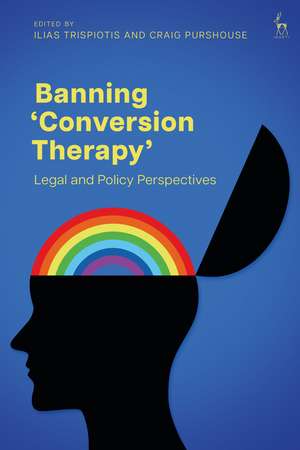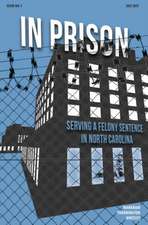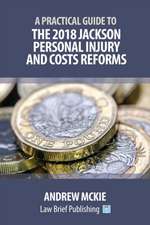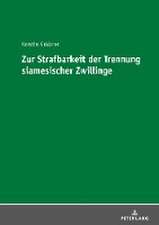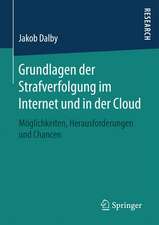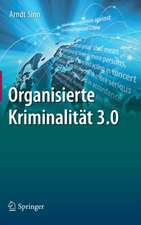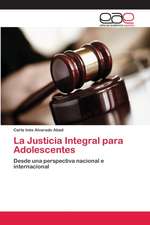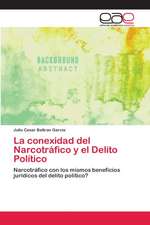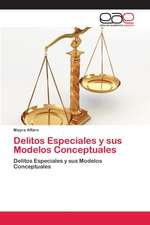Banning ‘Conversion Therapy’: Legal and Policy Perspectives
Editat de Ilias Trispiotis, Craig Purshouseen Limba Engleză Hardback – 29 noi 2023
Preț: 540.65 lei
Preț vechi: 628.66 lei
-14% Nou
Puncte Express: 811
Preț estimativ în valută:
103.45€ • 108.29$ • 86.11£
103.45€ • 108.29$ • 86.11£
Carte tipărită la comandă
Livrare economică 31 martie-14 aprilie
Preluare comenzi: 021 569.72.76
Specificații
ISBN-13: 9781509961153
ISBN-10: 1509961151
Pagini: 272
Dimensiuni: 156 x 234 x 25 mm
Greutate: 0.56 kg
Editura: Bloomsbury Publishing
Colecția Hart Publishing
Locul publicării:London, United Kingdom
ISBN-10: 1509961151
Pagini: 272
Dimensiuni: 156 x 234 x 25 mm
Greutate: 0.56 kg
Editura: Bloomsbury Publishing
Colecția Hart Publishing
Locul publicării:London, United Kingdom
Caracteristici
Examines a complex and topical legal problem in a clear and accessible way that can appeal to a diverse audience, including academics, practitioners, activists, and policy-makers who work on LGBTIQ+ rights, equality law, medical law, criminal law, and international human rights law
Notă biografică
Ilias Trispiotis is Professor of Human Rights Law at School of Law, University of Leeds, UK.Craig Purshouse is Senior Lecturer at the School of Law and Social Justice, University of Liverpool, UK.
Cuprins
Foreword, Victor Madrigal-Borloz (Harvard Law School, USA)Introduction, Ilias Trispiotis (University of Leeds, UK) and Craig Purshouse (University of Liverpool, UK)Part One: Reasons for a Ban1. The Legal Duty to Ban 'Conversion Therapy', Ilias Trispiotis (University of Leeds, UK)2. Conversion Practices and Coercive Control, Jonathan Herring (University of Oxford, UK)3. Historical, Clinical and Ethical Perspectives: An Update on 'I'm Your Handyman', Jack Drescher (Columbia University, USA)4. Feeling Pain and Shame: The Emotional Grammar of Banning 'Conversion Therapy', Senthorun Raj (Manchester Metropolitan University, UK)Part Two: The Scope of a Ban5. 'Conversion Therapy' and Children's Rights, Noam Peleg (University of New South Wales, Australia)6. How Do Practices to 'Convert' Childhood Gender Diversity Impact a Child's Right to Develop? Hannah Hirst (University of Sheffield, UK)7. Ensuring Trans Protection within a Ban on Conversion Practices, Lui Asquith (Russell-Cooke LLP, UK)8. Exorcism and Other Spiritual Modes of 'Conversion Therapy': Balancing Religious Liberty and Individual Rights, Javier García Oliva (University of Manchester, UK ) and Helen Hall (Nottingham Trent University, UK)Part Three: Beyond a Ban9. The Religious Dimension: Confronting Spiritual Abuse, Jayne Ozanne (Ban Conversion Therapy Coalition, UK)10. Nothing About Us Without Us: Listening to and Engaging with Survivors of Conversion Practices, Jordan Sullivan (Community-Based Research Centre, Canada) and Nick Schiavo (No Conversion Canada, Canada)11. 'Conversion Therapy' and Transformative Reparations, Natasa Mavronicola (University of Birmingham, UK) and Lee Davies (University of Birmingham, UK)
Recenzii
A powerful legal case against unethical, harmful and ineffective conversion practices.
This much-needed collection of interdisciplinary scholarship is an ideal primer for policymakers, advocates, and laypeople seeking to understand the history, forms, targets, and harms of so-called "conversion therapy" - as well as policy remedies for ending these cruel and pervasive practices. The chapter authors share expert insights for navigating the thorniest social, developmental, religious, and legal issues any ban on these practices would raise.
This much-needed collection of interdisciplinary scholarship is an ideal primer for policymakers, advocates, and laypeople seeking to understand the history, forms, targets, and harms of so-called "conversion therapy" - as well as policy remedies for ending these cruel and pervasive practices. The chapter authors share expert insights for navigating the thorniest social, developmental, religious, and legal issues any ban on these practices would raise.
